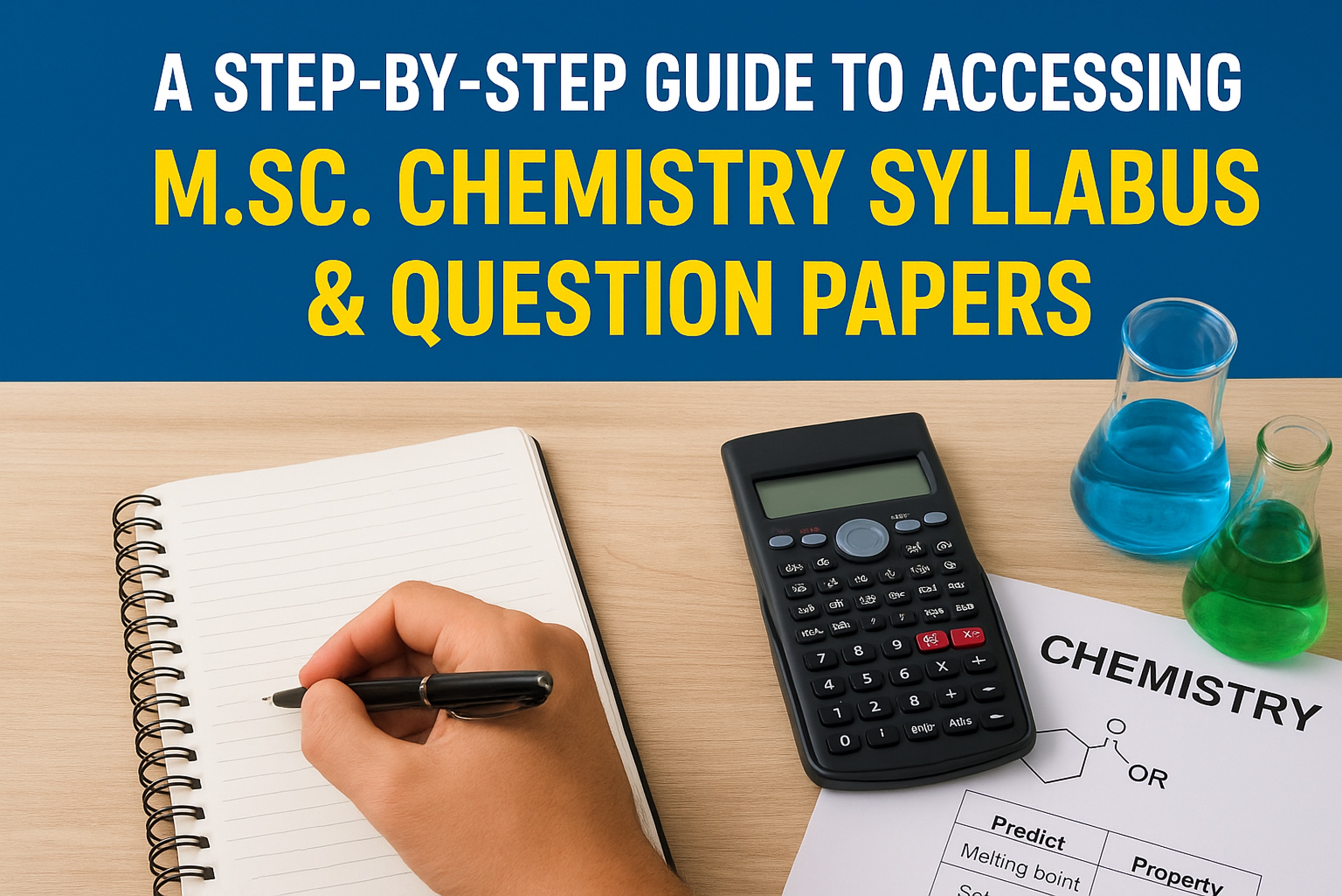Pursuing an M.Sc. in Chemistry is an exciting first step toward an exciting future in applied sciences, research, teaching, or pharmaceuticals. However, an extensive awareness of the course material and regular taking exams are necessary for success in postgraduate courses. Students at S. S. Agrawal College of Management & Technology, Navsari, learns from an organized program and easily available resources like past exam papers.
You will be better prepared for your academic journey by using this blog as a step-by-step guide to obtain the official M.Sc. Chemistry syllabus and past test papers.
Why the Syllabus and Question Papers Matter
It’s necessary to fully understand the importance of the courses and question papers for M.Sc. students before starting the stages.
- Clarity on Topics – The syllabus helps students avoid spending time on unrelated material by identifying what they must continue to learn.
- Exam-Oriented Learning – Exam trends and often questioned subjects can be inferred from previous question papers.
- Time Management – Students can better focus important subjects by analyzing question papers.
- Confidence Boost – You can attempt papers more successfully and have fewer problems if you are comfortable with test patterns.
For M.Sc. Chemistry, where subjects range from organic, inorganic, physical chemistry to spectroscopy, materials science, and research methodology, these tools act as your roadmap.
Step 1: Visit the Official Website
The first step is to visit the official website of S. S. Agrawal College of Management & Technology:
👉 www.ssagrawal.org
The homepage highlights different courses, announcements, and departmental updates. To find resources related to M.Sc. Chemistry, you need to navigate to the correct section.
Step 2: Navigate to the M.Sc. Chemistry Section
After landing on the main page:
- Find the option labeled Departments/Programs.
- Select M.Sc. Chemistry from the Science area.
This will take you to the specific program page, which offers a summary of the course, tasks, achievements and—above all—student resource interaction.
Step 3: Locate the Syllabus Link
Continue through to the Courses and Teaching section on the website for the M.Sc. Chemistry program.
- The official syllabus link is available here.
- Since the syllabus is frequently available in PDF format, downloading and reading it at any time is basic.
Because the M.Sc. The Chemistry program lasts for two academic years, make sure you download the version that aligns with your semester, which is Semester I – Semester IV.
Step 4: Access Previous Question Papers
The department offers previous exam question papers as an addition to the syllabus.
- These are usually organized by semester, but sometimes by subject as well.
- You can study question patterns over time by downloading these documents.
The method can be helpful, mainly before tests, since it allows you to find out if the focus of the paper is on mathematical applications, short concepts problems, or long-answer analytical questions.
Step 5: Organize Your Downloads
It’s a good idea to set for the correct digital or physical system after downloading the course content and test questions.
- Digital Method: Make Semester I, II, III, and IV folders on your laptop. Save the question papers and the syllabus within.
- Physical Method: Make copies and store them in a binder arranged by subject. Emphasize the syllabus’s important portions.
When tests come around, having your study materials organized ensures easy access.
Step 6: Use the Syllabus for Smart Study Planning
The syllabus is used as your study guide and is more than simply a formality. Reduce it into:
- Core Subjects: Physical, inorganic, and organic chemistry are the three main subjects.
- Specialized Modules: Environmental Chemistry, Nanotechnology, Spectroscopy, etc.
- Practical Work: experimental methods and laboratory-based learning.
- Research and Dissertation: a key component of the final year of college.
You may cover courses fully and reduce last-minute stress by organizing the course material into separate weekly study goals.
Step 7: Practice with Past Papers
Here are a few ideas for getting the most out of question papers:
- Identify Repeated Questions: Look for questions that have been asked during a number of years.
- Understand Question Styles: whether it is case-study based, descriptive, or mathematical.
- Time Yourself: By completing a paper within the given time, you may mimic test situations.
- Self-Evaluate: To find any errors, compare your responses to your notes or textbooks.
Accuracy and speed are increased by practicing in exam-like situations.
Step 8: Combine Resources for Success
The course material and test questions are important, but you must additionally add:
- Class Notes & Faculty Guidance – Attend lectures and take notes on important topics.
- Reference Books – Standard texts like Morrison & Boyd for Organic Chemistry, Atkins for Physical Chemistry, or Shriver & Atkins for Inorganic Chemistry.
- Online Resources – Scholarly publications and educational venues for a more deep understanding.
You will create an excellent practical and theoretical basis by combining these materials.
Tips for Maximum Benefit
- Stay Updated: Universities periodically revise their courses of study. Make sure you’re always working with the newest edition.
- Group Studies: Talk about question papers with classmates to learn new things.
- Regular Revision: Don’t simply read; describe the key points and make changes once a week.
- Track Progress: Keep track of completed subjects by using checklists.
Conclusion
An M.Sc. A Chemistry student’s path can prove difficult, but with the correct strategy, it can be rewarding and possible. You may improve your academic performance, improve trust in yourself, and match your study strategies with the requirements of the test by frequently accessing the syllabus and previous test questions.
All of the required educational resources are easy to find online at S. S. Agrawal College of Management & Technology, helping students to take charge of their education. This extensive manual assures that you may easily access resources and remain well-prepared for your academic goals, regardless of whether you are a current student or a potential candidate.

